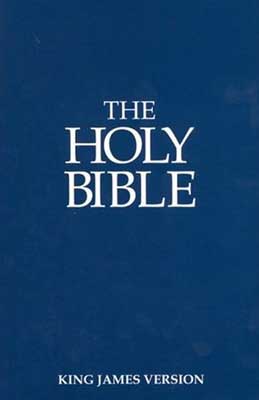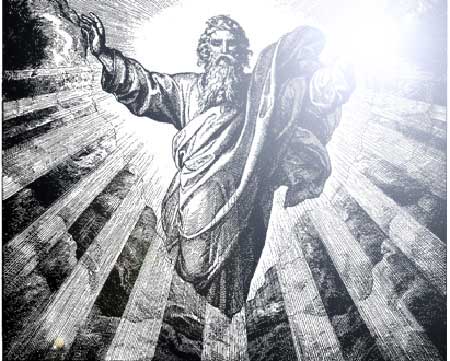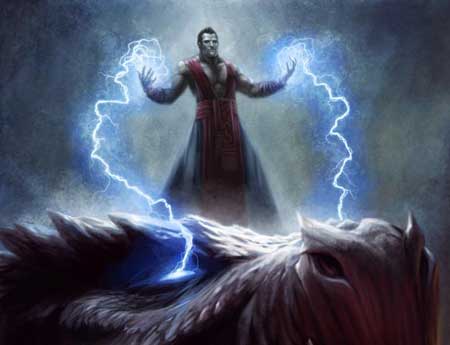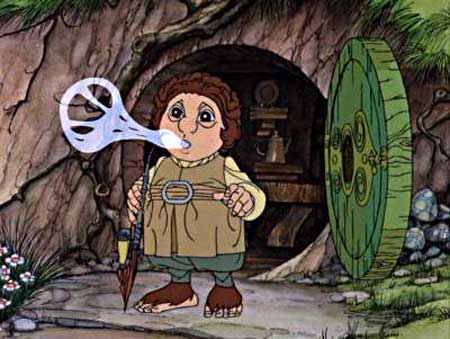The Holy Bible: A Book Review

The Holy Bible: A Book Review
 "First God made heaven & earth. The earth was without form and void, and darkness was upon the face of the deep; and the Spirit of God was moving over the face of the waters. And God said, "Let there be light"; and there was light."
With possibly one of the strongest opening lines in history, the Holy Bible really starts off swinging. Here we're not only introduced to the main character, named God, but are also informed that he's some sort of magical being (whether that's a vampire or a wizard or something, we don't know yet--we just know he can fly and shoot laser beams). The prose in this section is simply top notch, and you'll find that the action, atmosphere and language of the Holy Bible are carried off with a master's touch. But accompanying this impressive show of skill is also one of the book's greatest flaws: Verbosity. One of the first things they teach you in any writer's workshop is that every word in a novel should be integral to the story; never leave anything in that doesn't absolutely need to be there. So, while we as readers start the book all sweeping through demons and darkness like Ronnie James Dio--rocking out and firing lightbeams and building people out of dirt--it all quickly gets bogged down in unnecessary detail.
As readers we're enthralled by the mystic action; wondering exactly what kind of creature this God is, why he has these powers and what on earth he's going to do with them, and then all of a sudden we're pulled out of the action and forced to sit idly while the author describes an entire week (day by day) in God's life. I mean, that's great and all that we're getting some backstory on his character, but honestly, what happened with paragliding through Hell? I don't really care what your Wednesdays are like, or on which days you like to rest--get back to the action! Jesus, if we wanted to hear about your day, we would read your fucking LiveJournal, almighty.
"First God made heaven & earth. The earth was without form and void, and darkness was upon the face of the deep; and the Spirit of God was moving over the face of the waters. And God said, "Let there be light"; and there was light."
With possibly one of the strongest opening lines in history, the Holy Bible really starts off swinging. Here we're not only introduced to the main character, named God, but are also informed that he's some sort of magical being (whether that's a vampire or a wizard or something, we don't know yet--we just know he can fly and shoot laser beams). The prose in this section is simply top notch, and you'll find that the action, atmosphere and language of the Holy Bible are carried off with a master's touch. But accompanying this impressive show of skill is also one of the book's greatest flaws: Verbosity. One of the first things they teach you in any writer's workshop is that every word in a novel should be integral to the story; never leave anything in that doesn't absolutely need to be there. So, while we as readers start the book all sweeping through demons and darkness like Ronnie James Dio--rocking out and firing lightbeams and building people out of dirt--it all quickly gets bogged down in unnecessary detail.
As readers we're enthralled by the mystic action; wondering exactly what kind of creature this God is, why he has these powers and what on earth he's going to do with them, and then all of a sudden we're pulled out of the action and forced to sit idly while the author describes an entire week (day by day) in God's life. I mean, that's great and all that we're getting some backstory on his character, but honestly, what happened with paragliding through Hell? I don't really care what your Wednesdays are like, or on which days you like to rest--get back to the action! Jesus, if we wanted to hear about your day, we would read your fucking LiveJournal, almighty.
 "I think I look kinda fat here lol" -God
Due to the presence of these tangents, a lot of readers won't stick around for the meat of the story, and that would certainly be a shame because once it gets going, it really is one of the most exciting reads around (just to give you an idea of how good it is, the book has apparently gathered such an intense fanbase that some people give it away for free on the streets!). The first half of the book, called the Old Testament, is really more about getting a feel for the setting than it is advancing the story. During this time we get a glimpse of God's troubled past and are witness to a few key events that really allow the depth of the character to shine through (he's kind of a dark anti-hero; quick tempered and sometimes spiteful--but much like Julia Roberts in Pretty Woman, he actually has a heart of gold deep down).
The author takes this set-up time to explore the world thoroughly. But while even supporting characters are given their moment to shine, sometimes that gets distracting. For example, during Moses' adventures, we come to relate to him as a troubled sort of everyman. Sure, he was adopted by royalty, but he never really became complacent. He saw the mistreatment and suffering of the people around him, and he was moved into taking action. All good so far, right? It's kind of like Footloose or a Bruce Springsteen song: It's all about the plight of the working man. (And honestly, who exemplifies the working man more than slaves? All they do is work!)
"I think I look kinda fat here lol" -God
Due to the presence of these tangents, a lot of readers won't stick around for the meat of the story, and that would certainly be a shame because once it gets going, it really is one of the most exciting reads around (just to give you an idea of how good it is, the book has apparently gathered such an intense fanbase that some people give it away for free on the streets!). The first half of the book, called the Old Testament, is really more about getting a feel for the setting than it is advancing the story. During this time we get a glimpse of God's troubled past and are witness to a few key events that really allow the depth of the character to shine through (he's kind of a dark anti-hero; quick tempered and sometimes spiteful--but much like Julia Roberts in Pretty Woman, he actually has a heart of gold deep down).
The author takes this set-up time to explore the world thoroughly. But while even supporting characters are given their moment to shine, sometimes that gets distracting. For example, during Moses' adventures, we come to relate to him as a troubled sort of everyman. Sure, he was adopted by royalty, but he never really became complacent. He saw the mistreatment and suffering of the people around him, and he was moved into taking action. All good so far, right? It's kind of like Footloose or a Bruce Springsteen song: It's all about the plight of the working man. (And honestly, who exemplifies the working man more than slaves? All they do is work!)
 Pictured: Moses (essentially.)
It's a simple little story of class conflict and redemption, and then, almost without warning, everything suddenly gets magical: Oceans are parted, flaming shrubbery starts yelling at dudes and, in what is one of many disturbingly phallic metaphors littered throughout the book, Moses and the Pharaoh's magicians start slinging about their "snakes" and "staffs" to see whose is bigger. It's all quite exciting and imaginative, but it feels kind of like a bait and switch: We came into Moses' story reading The Grapes of Wrath, then wham! Moses finds out he's a Jew and shit goes totally Harry Potter.
Pictured: Moses (essentially.)
It's a simple little story of class conflict and redemption, and then, almost without warning, everything suddenly gets magical: Oceans are parted, flaming shrubbery starts yelling at dudes and, in what is one of many disturbingly phallic metaphors littered throughout the book, Moses and the Pharaoh's magicians start slinging about their "snakes" and "staffs" to see whose is bigger. It's all quite exciting and imaginative, but it feels kind of like a bait and switch: We came into Moses' story reading The Grapes of Wrath, then wham! Moses finds out he's a Jew and shit goes totally Harry Potter.
 In all fairness, the Jews are a notoriously magical people.
After what seems like 400 years, the Holy Bible finally finishes the setup phase and launches us into the main tale, where we meet our central character for the first time... even though it's still God. Sort of. It gets a little confusing, frankly: Our protagonist, God, is somehow also a character named Jesus Christ, who is the son of God and... listen, it's never quite clear what the genealogy is, or how God is his own son or anything (and what's up with the ghost?) but a lot of the set-up just has to be taken on faith. Now, the character of Jesus may not be the most original creation (he's kind of amalgam of three other prominent protagonists: The "awakened man" complex, like Neo from the Matrix; a bit of Superman's down home heroics; and an oddly compelling dash of Timothy Leary's "freaking out the squares" mentality) but he's oddly endearing nonetheless.
In all fairness, the Jews are a notoriously magical people.
After what seems like 400 years, the Holy Bible finally finishes the setup phase and launches us into the main tale, where we meet our central character for the first time... even though it's still God. Sort of. It gets a little confusing, frankly: Our protagonist, God, is somehow also a character named Jesus Christ, who is the son of God and... listen, it's never quite clear what the genealogy is, or how God is his own son or anything (and what's up with the ghost?) but a lot of the set-up just has to be taken on faith. Now, the character of Jesus may not be the most original creation (he's kind of amalgam of three other prominent protagonists: The "awakened man" complex, like Neo from the Matrix; a bit of Superman's down home heroics; and an oddly compelling dash of Timothy Leary's "freaking out the squares" mentality) but he's oddly endearing nonetheless.
 Pictured: Jesus H. Christ and his "Apostles of Funk."
And it's a good thing Jesus is such a likable protagonist, because his cast of supporting characters seems utterly disposable at times. No sooner are you introduced to an intriguing new character than the author brutally murders them in some bizarre fashion, for no real reason and often with little to no impact on the story itself. The character of John the Baptist, for example, was a personal favorite of mine. He read like a kind of gruff bearish figure (I mentally cast him as John Goodman) and his presence lent the book an almost whimsical twist. But just as I was getting attached to him, the author has him beheaded almost as a footnote!
This is all we John the Baptist fans get for a death scene: "And he sent, and beheaded John in the prison."
One sentence!
The Holy Bible kills off supporting characters like horror movies kill black people. Listen, I know that was kind of a spoiler, but it's quite hard to review a book like this without spoiling something: The plot twists, turns, snakes and gyrates like Axl Rose on ecstasy. John's death was a minor spoiler, but there are some big ones I'm avoiding here (hint: Watch for Zombies!). So, without going further into details that might spoil the work, just know that The Holy Bible is a rompin' stompin' fantasy adventure full of subtle morality and intricate allegory the likes of which we haven't seen since The Lord of the Rings trilogy.
Pictured: Jesus H. Christ and his "Apostles of Funk."
And it's a good thing Jesus is such a likable protagonist, because his cast of supporting characters seems utterly disposable at times. No sooner are you introduced to an intriguing new character than the author brutally murders them in some bizarre fashion, for no real reason and often with little to no impact on the story itself. The character of John the Baptist, for example, was a personal favorite of mine. He read like a kind of gruff bearish figure (I mentally cast him as John Goodman) and his presence lent the book an almost whimsical twist. But just as I was getting attached to him, the author has him beheaded almost as a footnote!
This is all we John the Baptist fans get for a death scene: "And he sent, and beheaded John in the prison."
One sentence!
The Holy Bible kills off supporting characters like horror movies kill black people. Listen, I know that was kind of a spoiler, but it's quite hard to review a book like this without spoiling something: The plot twists, turns, snakes and gyrates like Axl Rose on ecstasy. John's death was a minor spoiler, but there are some big ones I'm avoiding here (hint: Watch for Zombies!). So, without going further into details that might spoil the work, just know that The Holy Bible is a rompin' stompin' fantasy adventure full of subtle morality and intricate allegory the likes of which we haven't seen since The Lord of the Rings trilogy.
 "The Bible? Well, it's no Return of the King but I guess it's pretty all right."
Really, there are only a few criticisms I have: The sections where the author obviously forces their own political agenda into the story are rather distracting (at one point the whole story grinds to a halt so the Jesus character can give some sort of "sermon" on this "mount"-like thing that is little more than liberal propaganda extolling the benefits of a welfare state) and at times it seems like it could've used an editor with a heavier hand (1100 pages long?! Who do you think you are, David Foster Wallace?). I must say that overall, the Holy Bible is a story everybody should read at least once. Just keep in mind that though this may seem like your run of the mill fantasy adventure, there are a myriad of vicious maulings, explicit torture scenes, rape and prostitution, so it's definitely not for children!
Oh, and though there are some hints of a sequel (a Second Coming is mentioned a few times), I wouldn't hold my breath if I were you--no official deals have been signed at this time.
So, in summation, I'd give the Holy Bible seven out of te-AGGGGGGGGGGGGBLKkkkkk
Editor's Note: Our apologies, but while typing this up it seems that Robert has just mysteriously exploded in a cloud of sulfur. If we had to venture a guess, we'd say that he was literally dragged into Hell on the spot for this article--the powers that be were simply not content to wait for him to die for his punishment. If it helps to satisfy your curiosity, we have it on good authority that he was going to give it "seven out of 10 boners," and that he has not procreated, so his genetic line will end here.
"The Bible? Well, it's no Return of the King but I guess it's pretty all right."
Really, there are only a few criticisms I have: The sections where the author obviously forces their own political agenda into the story are rather distracting (at one point the whole story grinds to a halt so the Jesus character can give some sort of "sermon" on this "mount"-like thing that is little more than liberal propaganda extolling the benefits of a welfare state) and at times it seems like it could've used an editor with a heavier hand (1100 pages long?! Who do you think you are, David Foster Wallace?). I must say that overall, the Holy Bible is a story everybody should read at least once. Just keep in mind that though this may seem like your run of the mill fantasy adventure, there are a myriad of vicious maulings, explicit torture scenes, rape and prostitution, so it's definitely not for children!
Oh, and though there are some hints of a sequel (a Second Coming is mentioned a few times), I wouldn't hold my breath if I were you--no official deals have been signed at this time.
So, in summation, I'd give the Holy Bible seven out of te-AGGGGGGGGGGGGBLKkkkkk
Editor's Note: Our apologies, but while typing this up it seems that Robert has just mysteriously exploded in a cloud of sulfur. If we had to venture a guess, we'd say that he was literally dragged into Hell on the spot for this article--the powers that be were simply not content to wait for him to die for his punishment. If it helps to satisfy your curiosity, we have it on good authority that he was going to give it "seven out of 10 boners," and that he has not procreated, so his genetic line will end here.
Find Robert on Twitter, Facebook and his own site, I Fight Robots where you can FUCKING BRING IT.